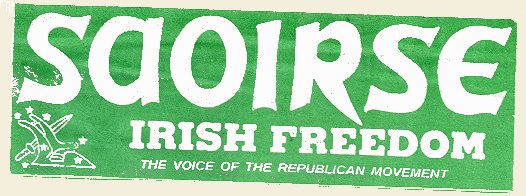Ó Brádaigh gives direct answers on RTÉ Radio
‘No National Parliament’

|
ON RTÉ Radio 1’s News at One programme on Sunday March 3, Republican Sinn Féin President Ruairí Ó Brádaigh was interviewed by Gerald Barry on the question of the legitimacy of the 26-County State and its institutions.
On the same programme a week earlier the Provisional’s Gerry
Adams had accepted the legitimacy of the 26-County army and police. What
follows is the complete broadcast beginning with Gerald Barry’s introduction:
“In 1986 when Gerry Adams and his colleagues made their first move on the road towards taking their seats in Dáil Éireann (sic) with its implicit recognition, a defiant Ruairí Ó Brádaigh denounced the direction in which his then party was headed. [A taped excerpt from the 1986 Ard-Fheis] ‘What we are asked to do today is to tip the scales that little bit in favour of parliamentary, constitutional and reformist action. Never, that’s what I say to you, never.’ So this weekend how does Ruairí Ó Brádaigh view Gerry Adams’s latest pronouncement which had been made in response to a direct challenge from PD candidate Michael McDowell?”
Ruairí Ó Brádaigh: What we have got here is not a position of our making in this generation. It is something we have inherited indeed from 80 years and more and when I hear the exchanges of Mr Adams and Mr McDowell it reminds me of reading the exchanges in the Free State parliament in the late 1920s with Mr McDowell now echoing what WT Cosgrave had to say (he being in power at the time) and Mr Adams saying what de Valera would have been about. Of course they were both in the parliament at this stage. What was happening was the gradual transition of Fianna Fáil at that time from a revolutionary Republican Movement, out of which they had come, into a constitutional party. Gerry Adams and his people are in much the same position so many years later. They’re gradually changing over and they’re almost fully on the constitutional path at this stage.
Gerald Barry: Is it your position and that of Republican Sinn Féin that you don’t recognise the Irish Army or the Garda Síochána as legitimate and that they are flawed as Dáil Éireann is flawed and is not a National Assembly at all?
RÓB: Well the position is, to begin with, we don’t accept British rule in this country, we never have and we don’t accept the British Government in the Six Counties…
GB: But we are talking about the 26 Counties here now.
RÓB: I know that but the 26-County State, from its origins has been in collaboration with British rule in the north and while we would say that the 26 County Parliament is a partitionist Parliament, and as you said indeed flawed, we would agree that that is the situation. Now that is not to say that that we want to see war being made on them or conflict or anything like that, but we say that this is an unfulfilled situation, that there is unfinished business and we would not go along with Mr Adams and indeed this has been for the past 16 years. Just as Cumann na nGaedheal/Fine Gael and later Fianna Fáil and after that Clann na Poblachta and then the Workers Party, all left the Republican Movement and became constitutional parties within the system. The same thing has happened with Mr Adams and the Provos.
GB: Well let me put this in very clear language. Is it your position that you do not recognise the moral legitimacy or the political legitimacy of Dáil Éireann, of the Garda Síochana and of the Defence Forces?
RÓB: What we are saying is that all of this is flawed, that they are not fulfilled, that we do not have a National Parliament, we do not have a National Army, we do not have a National Police Force – and indeed the sooner we have all those things the better – so that they are impaired.
GB: Does it mean they they cannot – these three institutions, Dáil Éireann, The Oireachtas, The Garda Síochana and the Defence Forces – cannot claim legitimacy as far as you are concerned?
RÓB: They are not, as I said, the National Parliament the National Army and the National Police Force and as such they are not acceptable.
GB: Is there a legitimate authority and is it in the end, as far as you are concerned and traditional Republicans are concerned, in the final analysis the Army Council of the IRA?
RÓB: Well of course we would take a longer time indeed that we have at our disposal to go into all that kind of thing. Any arrangements in Ireland at the present time are temporary — indeed the 1937 Constitution said this up to four years ago — pending the reintegration of the national territory and so on, that these we were told were stepping stones, that they weren’t the ultimate objective, that they were only staging posts on the way and to pretend that the 26 Counties is Ireland, the Irish parliament, the Irish army and the Irish police and so on. The 26 Counties is not Ireland and we have people talking about Ireland and ‘Northern Ireland’. We object very strongly to that and people rather than saying All Ireland are saying All Island now as if there were two separate countries or indeed nations God Bless the mark. We would say it’s the All-Ireland Football final and Hurling final not the All-Island.
GB: You say that we had been assured that these were stepping-stones – and that’s almost certainly true – but isn’t all history a series of stepping-stones?
RÓB: That may be and while the stepping-stones continue and evolve that is something, but what has happened every time seems to be that the people who put their feet on these stepping-stones seem to get absorbed into the existing system and the stepping-stones become an end in themselves. Power seems to be the only thing that matters and the national question and all that type of thing is put on the back burner and eventually it isn’t mentioned at all.
GB: Do you have nothing left in common with people like Gerry Adams and Martin McGuinness?
RÓB: Well no more than we have with the Workers Party or Fianna Fail or Fine Gael. It’s as simple as that.



